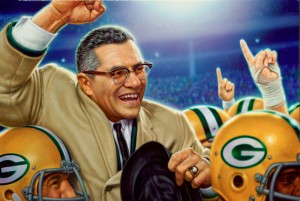While speaking to a large corporate audience in what would prove to
be his last keynote address, the legendary football coach Vince Lombardi
gave his audience a major piece of wisdom. "I'm going to share with you the key to success in any business,"he said, and then paused.
The room fell into a deep silence as the audience leaned forward. The pause continued a while longer, building the excitement.
"The secret, in a word, is 'heartpower,'" Lombardi continued. "Capture the heart, and you've captured the person. Get people to fall in love with your company."
Look around you at the companies that you love to follow and the leaders who run them: Meg Whitman, former CEO of eBay, the late Steve Jobs of Apple, and Reed Hastings of Netflix and the late Anita Roddick of The Body Shop.
These leaders, among so many, stand out-and so do their companies—because their passion for excellence is contagious. But a greater observation is necessary. They didn't just get there because they showed up and started talking. They built a solid company based on a passionate decision to upset the status quo, because they didn't like the status quo. Using the products they created to change the way we do things took perseverance, stubbornness, and passion, through the good times and the bad.
Great leaders do just that. They create a contagious, passionate vision with everything they touch. Many of the leaders I mentioned above can get angry, excited, and fired up because they care about their people and the products they send out into the world-and almost all of them never graduated from or even attended business school.
Simply put, they integrate the people who work for them as like-minded human beings with all the same passions and drive as anyone else, an integral part of the company's goals. These leaders never treat their employees like subordinates.
These leaders have made a lifetime commitment to becoming better by keeping their eye on the trends and raising their standards, and it shows in every inch of their organizations. They capture the heart and the imagination.
The biggest danger for a company nowadays is when they stagnate, refusing to evolve.
I believe this comes from a myth, the belief that one big idea is enough to live on happily ever after. In today's environment, consistently great ideas must be cranked out and brought to the forefront as quickly as possible. In order to leave a legacy, leaders must act and think like entrepreneurs.
Medium and large companies that run like entrepreneurial start-ups often create relatively small team-to-team and peer-to-peer environments. Hierarchies appear fuzzy to an outsider because these environments are flexible, creative, and free of rules and regulations. Even the CEO is available to every member of the staff. Plain and simple, these medium and large companies operate like small companies.
Internal Darwinism
In entrepreneurially run organizations, each team member is an active participant in the company's success. Participants become contributors in this type of paradigm, solving problems themselves, free to make decisions that in larger organizations might take weeks for approval from higher-ups.
These organizations operate on cyclical time, not linear time. Each member takes responsibility for when and how the work gets done. People begin to rely more on inspirational moments than on a clock.
People in these types of organizations are contagious to be around, as they begin to eat, sleep, and drink what they are working on. This is when team members begin to develop an almost cult-like following, becoming evangelists for the brand and working at midnight just as easily as they might work at 10:00 am.
This is the power of running your organization like an entrepreneurial start-up. People become fully engaged in these environments, refusing to leave.
In many of these organizations, the bulk of employees have been with the company since its inception. No matter how big your company may get, keep everyone in the organization in touch with the passion of the company's vision.
Every great leader I have coached maintains these uncompromising qualities. Their leadership styles are uniquely based on their personality and the values they truly believe in. They are contagious to be around and have a vision so clear and intoxicating, they are capable of drawing in a new hire, making each and every one feel as if they are part of a contributing force. These qualities also calm new hires, especially when someone has to work with a famous leader.
Inside these entrepreneurially run companies, it boils down to one thing and one thing only: trust. Ensuring that every manager, executive, and team leader is heads and shoulders above the rest requires time and effort. You must raise internal standards but give up control. By raising your people's standards and professionalism, you can step back and trust that the work is getting done to exacting standards.
Start destroying the bottlenecks of communication and approval. Trust is the key to a lasting legacy.
Technology will entice more and more people around the world to become entrepreneurs, and entrepreneurs always create disruption as they destroy entrenched business models in favor of a more efficient and more profitable business model. It is business Darwinism.
As John Doerr of Kleiner Perkins venture capital firm-who invested in Netscape, Amazon, Google, and Bloom Energy when they were just starting-stated on 60 Minutes with Lesley Stall, "That's my job, to find entrepreneurs who are going to change the world-and then help them."
So, I ask you now as a leader, here in the death throes of Industrial Age thinking, what kind of company are you going to invent? Where do you want to go? What possibilities are out there awaiting you?
The ideas are endless.
Thanks for reading,








